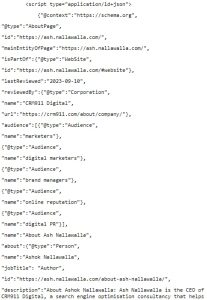By Ash Nallawalla
Structured data tags are commonly known as Schema Markup, and are considered optional for websites. Most business owners are not web-savvy, so they won’t ask for such tags. Is schema markup really optional, and what are the traps for agencies? Let’s break this up to understand the dilemma better.
Optional Markup?
The web developer could consider any code that does not affect the functionality or appearance of a web page “optional”. After all, the business owner asked for a “website,” and they are happy to receive something that works as ordered.
Many new website orders include a side order of “SEO”, but the devil is always in the details. It’s a great upsell, but not all web designers and developers have SEO expertise on tap. The ideal outcome should be a search-friendly website that can be nurtured by a continuing course of SEO activities such as content and links.
Agency owners and managers are conscious of client budget concerns, so they might be tempted to onboard a new client with a low price point. In many cases, a web design agency might never work with that client again. Later on, an SEO consultant or agency might have to work on the website.
Agency SOPs
Agencies come in all shapes and sizes, each with its own unique skill sets, either in-house or outsourced. While the core competency might be SEO or web design, not both, they all share a common goal of maintaining efficiency and professionalism. This is where Standard Operating Procedures (SOPs) come into play, outlining the range of activities that concern client engagement, such as prospecting, sales, onboarding, service delivery, and ongoing deliverables. They often include detailed task descriptions and checklists, but sometimes might be less detailed.
Many agency owners have their preferred suite of deliverables, which develops internal expertise and continuity. For example, an agency might build a new site on a third-party, managed CMS platform such as Wix or Duda, a managed WordPress or Drupal instance, or a headless CMS. The agency might even choose to work only on the Microsoft flavour of NET (dot net).
These operational choices usually result from the unique mix of agency founders and senior staff, who bring their backgrounds and personalities with them.
Schema Markup
Most expert SEOs agree that structured data tags are valuable. Many say that they do not have a direct impact on rankings, so why bother with them? Here are three compelling reasons:
- The web page becomes eligible for showing as a rich snippet. This is “Position zero”, that is, it sits higher than the first result in a SERP. There’s your ranking boost. No guarantees that this will happen, but it’s best to be prepared before a competing website implements schema tags.
- Search engines now understand entities and their context. An Indian religious website might use the Sanskrit word “avatar” to refer to an incarnation of a Hindu deity. A computing article might use the same word to describe an image. An entertainment website might use it to refer to a movie of that name.
- Specific schema tags are beneficial, such as the Organization type, which can help to manifest a knowledge panel for the brand name. Product schema tags help to differentiate product variants, for example
Sample Schema

Challenges for Agencies
The main challenge is time. Adding something that a client cannot see on the web page takes time, both for the developer and for the account manager to explain it to the client.
The developer needs to become educated about the thousands of schema tags out there and which ones might be beneficial. If the agency prefers to cater to a niche, such as law firms or SaaS companies, it can look up the relevant tags and add them to its implementation checklists.
The preferred CMS might not play nicely with schema tags. For example, some so-called SEO plugins for WordPress have an option for them, but the same tag will show on every page – which is overkill. For example, the Organization type should only appear on the home page.
Don’t boil the ocean. Not all tags are useful. For example, the WebPage type is rather pointless when a website contains only web pages. A schema type consists of properties – sometimes dozens of them, but not every property needs to be used as a first cut. Later on, experimentation (billable time!) can lead to some fine-tuning.
About the Author

Ash Nallawalla is a Melbourne, Australia-based consultant who works with agencies and clients. He is the author of Accidental SEO Manager, which is available on Amazon. He has over 20 years of professional SEO experience, mostly in-house, in enterprise SEO and in agencies. URL: https://ash.nallawalla.com
« Back to articles